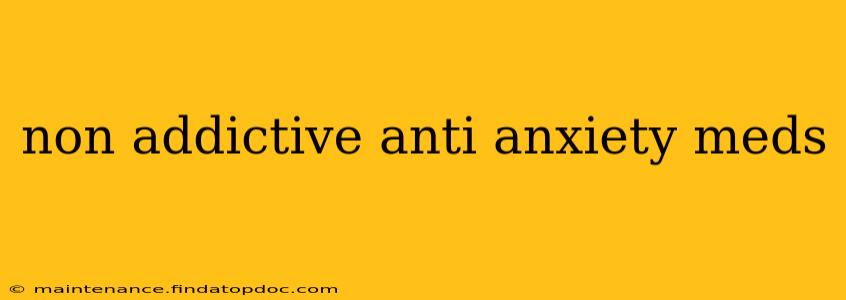Anxiety disorders affect millions, making the search for effective, non-addictive treatments crucial. While the term "non-addictive" requires careful consideration (as all medications carry potential risks), this guide explores options less likely to lead to dependence compared to benzodiazepines. Remember, this information is for educational purposes and should not replace consultation with a healthcare professional. Always discuss your treatment options with a doctor or psychiatrist before starting any medication.
What are Anxiety Disorders?
Before diving into treatments, let's clarify what anxiety disorders encompass. Anxiety isn't simply feeling nervous occasionally; it's characterized by persistent, excessive worry and fear that significantly impacts daily life. Symptoms can include:
- Physical: Rapid heartbeat, shortness of breath, trembling, sweating, muscle tension, fatigue.
- Psychological: Excessive worry, irritability, difficulty concentrating, sleep disturbances, feelings of dread or impending doom.
Several types of anxiety disorders exist, including generalized anxiety disorder (GAD), panic disorder, social anxiety disorder, and specific phobias. Understanding your specific diagnosis helps your doctor determine the most appropriate treatment.
What Medications are Considered Less Addictive for Anxiety?
While no medication is entirely without the potential for side effects or misuse, certain classes are generally considered less prone to physical dependence than benzodiazepines (like Xanax or Ativan), which are known for their addictive potential and should be used only short-term and under strict medical supervision. These less addictive options include:
1. Selective Serotonin Reuptake Inhibitors (SSRIs)
SSRIs, such as sertraline (Zoloft), paroxetine (Paxil), escitalopram (Lexapro), fluoxetine (Prozac), and citalopram (Celexa), are frequently prescribed for anxiety disorders. They work by increasing serotonin levels in the brain, a neurotransmitter associated with mood regulation. SSRIs generally have a lower risk of dependence compared to benzodiazepines but can still cause withdrawal symptoms if stopped abruptly.
2. Serotonin-Norepinephrine Reuptake Inhibitors (SNRIs)
SNRIs, including venlafaxine (Effexor) and duloxetine (Cymbalta), affect both serotonin and norepinephrine levels. Like SSRIs, they are generally considered less addictive than benzodiazepines, but gradual tapering is advised when discontinuing treatment to minimize withdrawal effects.
3. Buspirone (Buspar)
Buspirone is a different type of anxiolytic medication that doesn't belong to the benzodiazepine family. It's known for its relatively low potential for dependence and is often prescribed for long-term management of generalized anxiety disorder. However, it can take several weeks to become fully effective.
4. Beta-Blockers
While primarily used for heart conditions, certain beta-blockers can help manage physical symptoms of anxiety, such as rapid heartbeat and trembling, particularly in situations like public speaking. They don't address the underlying psychological aspects of anxiety and are not typically used as a standalone treatment for anxiety disorders.
What are the Side Effects of Non-Addictive Anti-Anxiety Medications?
It's crucial to be aware that all medications, including those considered less addictive, can have side effects. These can vary depending on the individual and the specific medication. Common side effects may include:
- Nausea
- Headache
- Dizziness
- Sleep disturbances (insomnia or excessive sleepiness)
- Sexual dysfunction
- Weight changes
- Dry mouth
Always inform your doctor about any side effects you experience. They may be able to adjust your dosage or suggest alternative treatment options.
Are there Non-Medication Treatments for Anxiety?
Non-medication approaches are often beneficial, either as primary treatment or in conjunction with medication. These include:
- Therapy: Cognitive Behavioral Therapy (CBT) and other therapeutic approaches are highly effective in managing anxiety.
- Lifestyle changes: Regular exercise, a balanced diet, sufficient sleep, and stress-reduction techniques like mindfulness and yoga can significantly improve anxiety symptoms.
How Long Does it Take for Non-Addictive Anti-Anxiety Medications to Work?
The onset of effects varies depending on the medication and individual response. Some individuals may experience relief within a few weeks, while others may need several weeks or even months to see significant improvement. It’s crucial to remain patient and work closely with your doctor.
Can I Stop Taking Non-Addictive Anti-Anxiety Medication Cold Turkey?
No. Even medications considered less addictive can cause withdrawal symptoms if stopped abruptly. Always follow your doctor's instructions regarding tapering off the medication to minimize withdrawal effects. Sudden cessation can lead to unpleasant and sometimes serious symptoms.
What if My Anti-Anxiety Medication Isn't Working?
If you're not experiencing improvement with your current medication, it's essential to discuss it with your doctor. They may adjust your dosage, switch you to a different medication, or recommend additional therapies.
This information is for general knowledge and doesn't constitute medical advice. Consult a healthcare professional for diagnosis and treatment of anxiety disorders. They can assess your individual needs and help you develop a comprehensive treatment plan.
